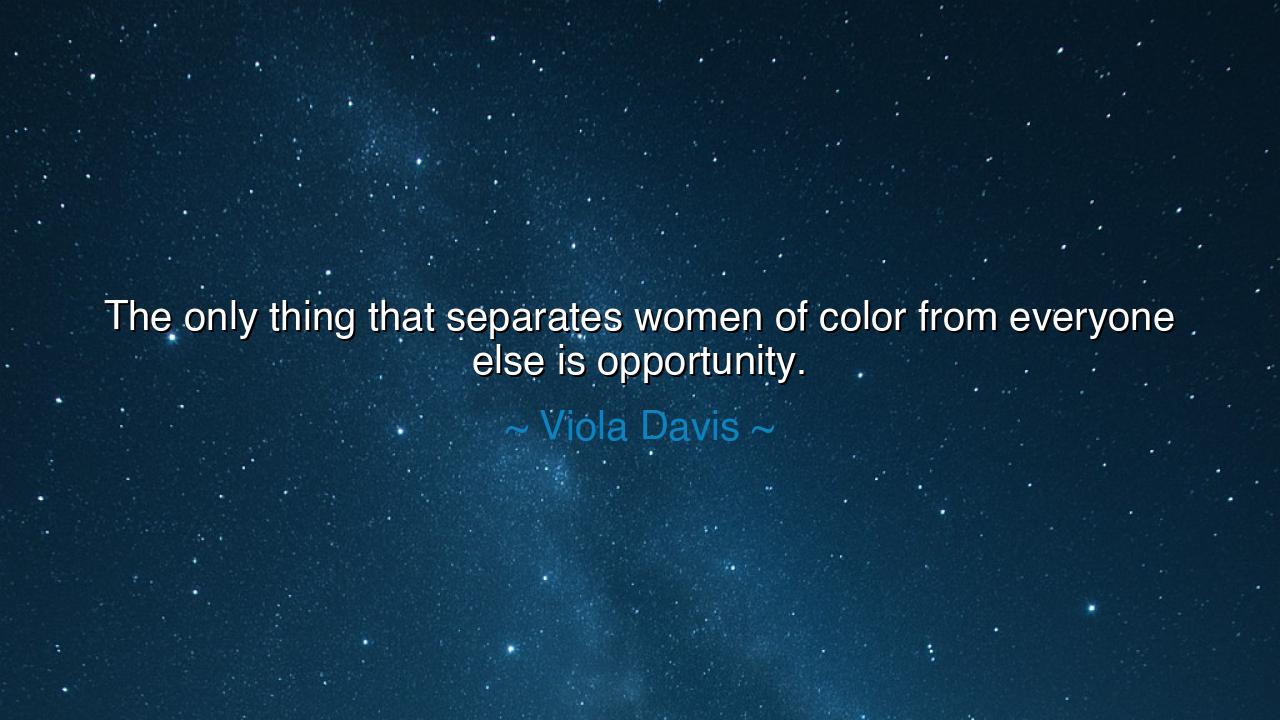
The only thing that separates women of color from everyone else






Viola Davis, warrior of stage and screen, lifted her voice in righteous truth when she declared: “The only thing that separates women of color from everyone else is opportunity.” These words are not lamentation, but revelation. They cut through centuries of prejudice and falsehood to proclaim that talent, brilliance, and worth are not the possessions of one race or class, but the common inheritance of all humanity. What withholds greatness, then, is not the absence of ability, but the denial of doors—the chains of exclusion forged by history.
The origin of this quote comes from Davis’s own life. Born into poverty in South Carolina, raised in hardship, she rose through sheer determination and unshakable craft to become the first Black woman to win the Triple Crown of Acting: an Oscar, an Emmy, and a Tony. Yet even she, crowned with honors, spoke not of her triumphs but of the countless women of color whose brilliance went unseen because opportunity was withheld. Her words remind us that genius lies waiting, silenced not by lack of fire, but by the walls erected to contain it.
History itself testifies. Consider Harriet Tubman, who led enslaved men and women through the night along the Underground Railroad. She was no less strategic than the greatest generals, no less courageous than the boldest heroes, yet her battlefield was hidden, her victories unsung by the chronicles of power. Had opportunity been hers in the halls of government or war, she might have been a stateswoman of renown. Instead, she carved greatness from the margins, proving that lack of opportunity could not extinguish the flame of destiny.
In modern times, too, we see the truth in the story of Katherine Johnson, the Black mathematician whose calculations carried astronauts safely into orbit. For decades her genius was hidden in obscurity, while men reaped glory. Only when the veil was lifted did the world see what had been true all along: that opportunity had been the only barrier between her and recognition. Davis’s words echo in her life: the brilliance of women of color shines brightest when allowed to stand in the light.
Therefore, O children of justice, let this wisdom be etched into your hearts. Do not ask whether women of color are capable, for the answer is written in history’s hidden pages. Ask instead why they were not given the stage, the pen, the crown. The measure of a society’s greatness is not in how it exalts the privileged, but in how it opens its gates to the silenced. For opportunity is the bridge between obscurity and glory, and once given, it reveals that power, wisdom, and beauty were there all along.






VTLe Van Tung
Viola Davis' quote challenges us to confront the role that systemic inequality plays in limiting the potential of women of color. If opportunity is the only thing separating them, how can we remove the barriers that prevent access to those opportunities? What role does privilege play in this dynamic, and how can individuals, organizations, and society work together to create a truly inclusive environment for women of color?
ANanh nguyen
What does it say about society that women of color, despite their talent, often face greater challenges in accessing opportunities? Viola Davis’ statement brings attention to the racial and gender gaps in representation, especially in industries like entertainment and business. How can we not only expand opportunities but also dismantle the stereotypes and structures that continue to hinder women of color from achieving their full potential?
BTBao Tram
Is it fair to say that the only thing separating women of color from others is opportunity, or does this oversimplify the complexities of race, gender, and social barriers? While opportunity plays a critical role, are there other factors—such as implicit bias, cultural expectations, and historical inequities—that need to be addressed to truly level the playing field? How do we begin to dismantle the intersectional barriers women of color face?
Y139 - Nguyen Thi Nhu Y 12a2
Could this quote be an argument for the importance of equal access to resources, opportunities, and platforms for women of color? Viola Davis seems to point out that women of color face a specific form of disadvantage, not due to inherent differences, but because of a lack of opportunity. How do we change societal systems and structures to ensure that all women, regardless of race, have equal access to the opportunities that can propel them forward?
LHNguyen Long Hoang
Is Viola Davis suggesting that women of color are inherently the same as everyone else, except for the opportunity they receive? This perspective highlights the systemic barriers and lack of access that women of color often face in society. How can we ensure that opportunity is equally available to all, regardless of race or gender? Is the solution to focus on leveling the playing field or on addressing deeper cultural biases?